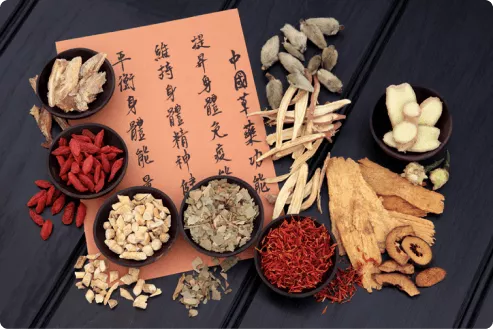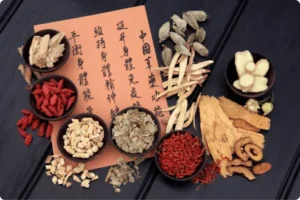In January 2023, Memorial Sloan Kettering Cancer Center published a study* demonstrating the safe and effective use of Chinese Herbal Medicines for the management of short-term adverse effects of cancer treatments. The study was a joint effort between the Cancer Center, Pharmacy, Herbal Oncology Program and Integrative Medicine Departments and demonstrates the safe and effective concurrent use of selected Chinese Herbal Formulas to manage and resolve selected adverse effects and promote and restore normal healthy function.
The following Chinese Herbal Formulas were studied in the management of three common adverse effects of cancer treatments:
Chronic Insomnia: Jia Wei Suan Zao Ren
Constipation: Ma Zi Ren Wan
Chronic Diarrhea: Shen Ling Bai Zhu San
These common formulas are readily available from multiple high-quality suppliers and can be found in capsule, tablet and freeze-dried granule forms. ** These formulas can also be compounded by a Chinese Herbal Pharmacy and made into teas. Chinese Herbal Formulas are typically dosed 2-4x per day taken with warm water or tea and with meals.
There were 851 outpatients in the study. 84% of participants were undergoing active treatment for multiple cancers. The Herbal Oncology Program dispensed 1,266 prescriptions over the course of the study to address pain, fatigue, poor appetite, gastrointestinal and mood disorders as well as disrupted sleep related to treatment. Participants surveyed expressed the need to seek treatment for unmet needs for management of adverse effects and support for health and quality of life.
The study demonstrated a high level of participant satisfaction and relief while incorporating Chinese Herbs into their care plan with the support of their oncology team. The formulas selected were of high-quality vetted ingredients, supported by research, and provided excellent symptom management as well as restoration of healthy function, and did not interfere with their oncology treatments.
The study team reports that patients requested and received support for acid reflux, bloating and indigestion, dizziness, fatigue inflammation, insomnia, mood, nausea and vomiting, pain, and other unspecified adverse effects. Additional herbal prescriptions were dispensed for acute cold and flu, cough, as well as for symptoms of fatigue, allergy, dizziness, and hot flashes, but were not part of the study formulations.
Comments:
The use of Modern Chinese Herbal medicine is well supported by research and wide clinical use.
Many Chinese Herbal formulas, such as those used in this study, fall into a “nutritive” category in which tissue repair and normalization and enhancement of structure and function can be achieved without deleterious drug-herb, radiotherapy-herb, immune-therapy or targeted therapy-herb interactions.
I regularly recommend Chinese Herbal Medicines as well as Acupuncture for management of adverse effects of treatments and for nurturing, promoting, and restoring normal healthy function. This allows patients not only to be able to successfully complete their course of treatments, but also to enjoy and maintain healthy function and quality of life. This also gives the patient a sense of agency and control and the feeling that they are taking something life giving and non-toxic as well as efficacious.
Symptom management of adverse effects in conventional oncology usually adds more pharmaceuticals to the care plan and rarely results in repair or sustained restoration of healthy function and can come with additional drug toxicities.
This study serves as a prototype for future studies and demonstrates both the safety and efficacy of Chinese Herbal Medicines for managing and resolving common adverse effects of cancer treatments. This study is also a model of collaborative teams composed of clinicians with diverse skilsl and training working together with mutual respect in service to best outcomes for patients.
This is inherently the model of the OutSmart Cancer® System which is devoted to multi-disciplinary, multi-faceted, cooperative, and inclusive teams that offer both the best disease care along with a health model for cancer patients and cancer survivors.
If health is the desired outcome, there must be a plan for HEALTH designed and implemented by health experts on the team. This fills in the missing health side of the cancer equation in conventional oncology care which remains disease focused and is therefore limited and not comprehensive.
I have been privileged and honored to be able to demonstrate the value of this model over 35 years of clinical practice in concert with leading oncology teams that realize the value of including a multi-faceted integrative approach that contributes a health model for their patients.
*Hou YN, Chimonas S, Gubili J, Deng G, Mao JJ. Integrating herbal medicine into oncology care delivery: development, implementation, and evaluation of a novel program. Support Care Cancer. 2023 Jan 21;31(2):128. doi: 10.1007/s00520-023-07577-x. PMID: 36680628; PMCID: PMC9860233.
**I recommend and have no affiliations with these high quality Chinese Herbal Suppliers: Sun Ten, Blue Poppy, Evergreen, May Way Herbs, TCMZone, to name a few.
Additional Selected References
Yang M, Feng Y, Zhang YL, Smith CM, Hou YN, Wang H, Deng G, Mao JJ. Herbal formula MaZiRenWan (Hemp Seed Pill) for constipation: a systematic review with meta-analysis. Phytomedicine. 2021;82:153459.doi: 10.1016/j.phymed.2021.153459. [PubMed] [CrossRef] [Google Scholar]
Wang H, Hou YN, Yang M, Feng Y, Zhang YL, Smith CM, Hou W, Mao JJ, Deng G. Herbal formula Shenling Baizhu San for chronic diarrhea in adults: a systematic review and meta-analysis. Integr Cancer Ther. 2022;21:15347354221081214. doi: 10.1177/15347354221081214. [PMC free article] [PubMed] [CrossRef] [Google Scholar]
Xiang Y, Guo Z, Zhu P, Chen J, Huang Y. Traditional Chinese medicine as a cancer treatment: modern perspectives of ancient but advanced science. Cancer Med. 2019;8(5):1958–1975. doi: 10.1002/cam4.2108. [PMC free article] [PubMed] [CrossRef] [Google Scholar]


